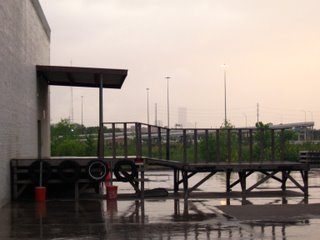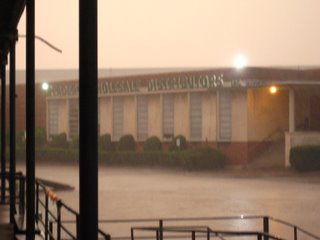Houston is home to a guerrilla marketing campaign whose slogan—"Houston. It's Worth It."—means exactly what you think it might mean but aren't completely sure. It makes sense, though. Most of the young people you meet in Houston are from Houston, or from somewhere where Houston is somewhere: Huntsville, Liberty, Pasadena, China; towns named after other places. The idea is more to keep talent from leaving Houston than attracting it from elsewhere. At least, attracting it to Houston as a destination city; the oil wealth has always brought some people here.
In the marketing materials there's even a list of 20 things that are worth it:
The heat The humidity The hurricanes The flying cockroaches The mosquitoes The traffic The construction The sprawl The refineries The ridicule The pollen The air The billboard The flooding The image The property taxes The short springs The long summers The potholes The no mountains
The idea, at least partially, is to create goodwill through this sort of self-deprecation. For it's easy to like anyone, or any place, that doesn't take itself too seriously. "I like places with low self-esteem," says Benji Mason, whose couch I sleep on for a few nights after I show up at Third Ward Bikes, one of Workshop Houston's workshops. Benji's an artist-in-residence at DiverseWorks and an employee at Workshop Houston, which runs a number of programs for teenagers in the Third Ward. He's smart and interesting, and seems to enjoy his life here. More importantly, Benji's a transplant: he's a Vermonter.
There are good things about Houston that are obvious to outsiders. The Menil Collection, for one, all of which is free. This includes the Rothko Chapel, a small, non-denominational building “inspired by the paintings of American abstract expressionist Mark Rothko,” whose has a number of canvases therein; the main Menil collection; a collection of Cy Twombly's work; and the Byzantine Chapel, which contains the fresco of a small Cypriot chapel with the blessing of the Church of Cyprus and the Turkish government.
Likewise, the medical care in Houston is reputed to be first rate, and Rice University also has a good reputation. (Rice students have a reputation in Houston for being spoiled and impractical, however.)
At lunchtime at Third Ward Bikes, Benji drives first to a taco stand, which is closed, and then to a Vietnamese sandwich shop. “There's a lot of money in Houston and not that much, compared to places like New York or San Francisco, to spend it on,” he says to explain Workshop Houston's funding success. Their annual budget is around $120,000. “You go to San Francisco and try to start a new program, and there's already so many other good programs out there.”
This I already know. The community bike shop where I volunteer, the Bike Kitchen, has an annual budget of around $10,000 and no paid staff members. The shop has been around for almost as long as Benji's—by our calculations, about six months less. This opportunity, perversely, is one of the things Benji likes. “It's wide open here,” he says, and gestures toward the cluster of larger high-rises that comprise downtown. “The cool thing is, if you want to start something cool, you can get a lot of support.”
I don't think Benji has a skewed view of Houston. One of his acquaintances, Jeff, is a musician and computer programmer at NASA. He has offered to give the shop whatever money it needs. “I told them, 'Just let me know,'” Jeff says. “If they need ten thousand, I could probably come up with it.” Jeff's not particularly wealthy either, but he wants to give back to his community. Oh, and he's 30.
Still, Benji can't imagine staying indefinitely. "I've been here since graduation" from college in 2002, he says. "I'll probably leave in another year or two." Where to? “Maybe Philadelphia,” Benji says. It's another city with low self-esteem.

At the sandwich shop, everything costs $2.50. I consider buying two, because I am not sure of the size. As we wait, I mention to Benji that I'm so impressed you can buy a 24 oz. Shiner Bock at a liquor store for $2. “The thing is, in Texas, that's not a cheap beer,” he says. There's a bar near him that serves Pabst Blue Ribbon—PBR, popular because it's inoffensive and inexpensive—for 85 cents. Shiner Bock wouldn't even come up as a cheap beer here, where at home in San Francisco, generally, a six-pack of cans is $6 and bottles is $8 or so.
The sandwiches are good, and large enough, certainly much larger than I expect. We drive through a “little” storm on the way back to the bike shop. The day I leave Houston, three days from now, I-45 will essentially be shut down from flooding from this same storm system, and I-10 will be marked by inaccurate signs that say the highway is closed just ahead.
“When I first got here, Zach”—one of the other founders of Third Ward Bikes—“had to teach me flood driving,” Benji says. “Try to stay to the center of the road. Don't drive too slow, but don't drive too fast either, because that's an asshole move that makes waves.” I look at him, but he's concentrating on driving. “Basically go where you need to go,” he says.

Because of the rain the shop is quiet. There's one small kid fiddling with his brakes. “Do you get Vietnamese sandwiches in San Francisco?” one of the mechanics asks. His mouth is full, so the words come out in a rounded jumble. He's a graduate of the University of Houston and a native of the city. Indeed, he's never lived anywhere else.
I tell him that's there's at least one shop I can think of, and maybe more, but you have to seek them out, mostly. Not this cheap, though.
He nods, happy that Houston wins out somewhere, somehow.

No comments:
Post a Comment